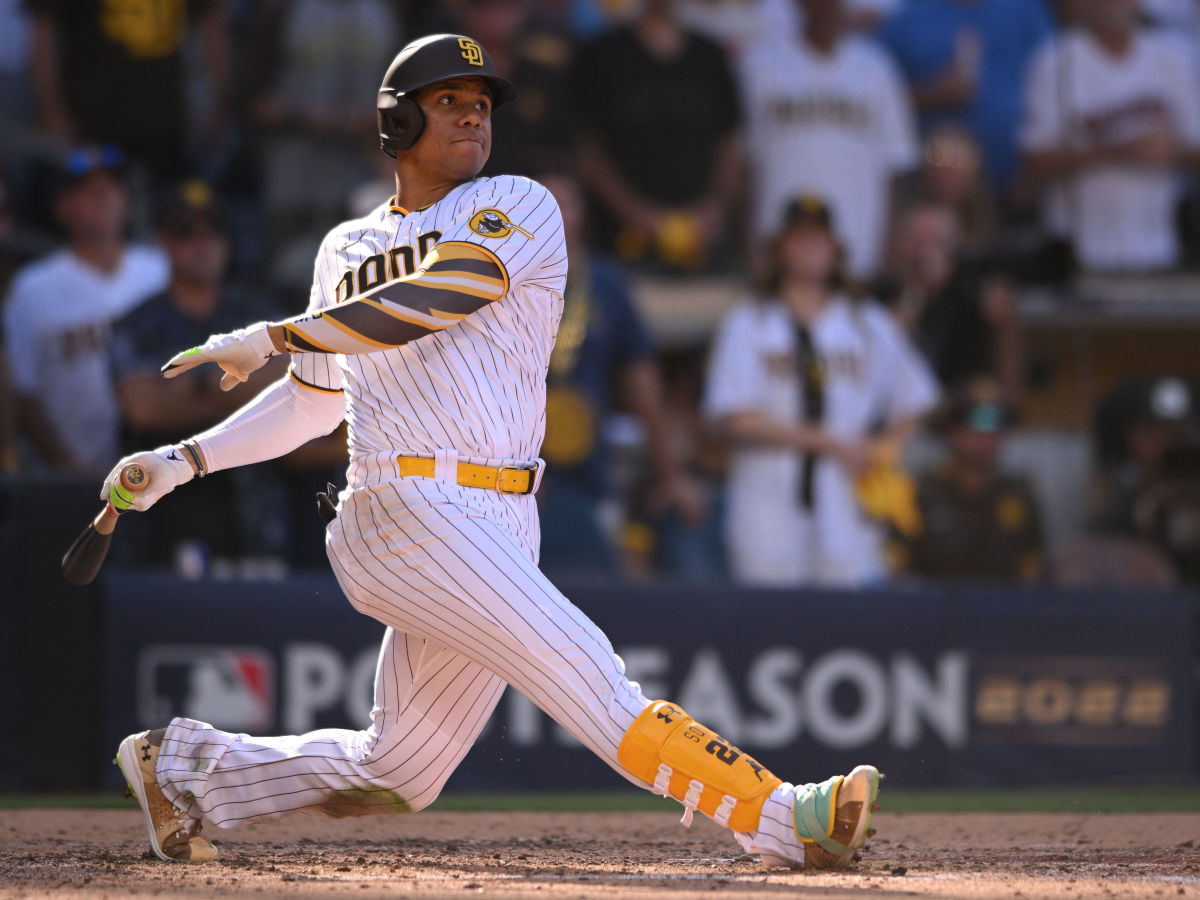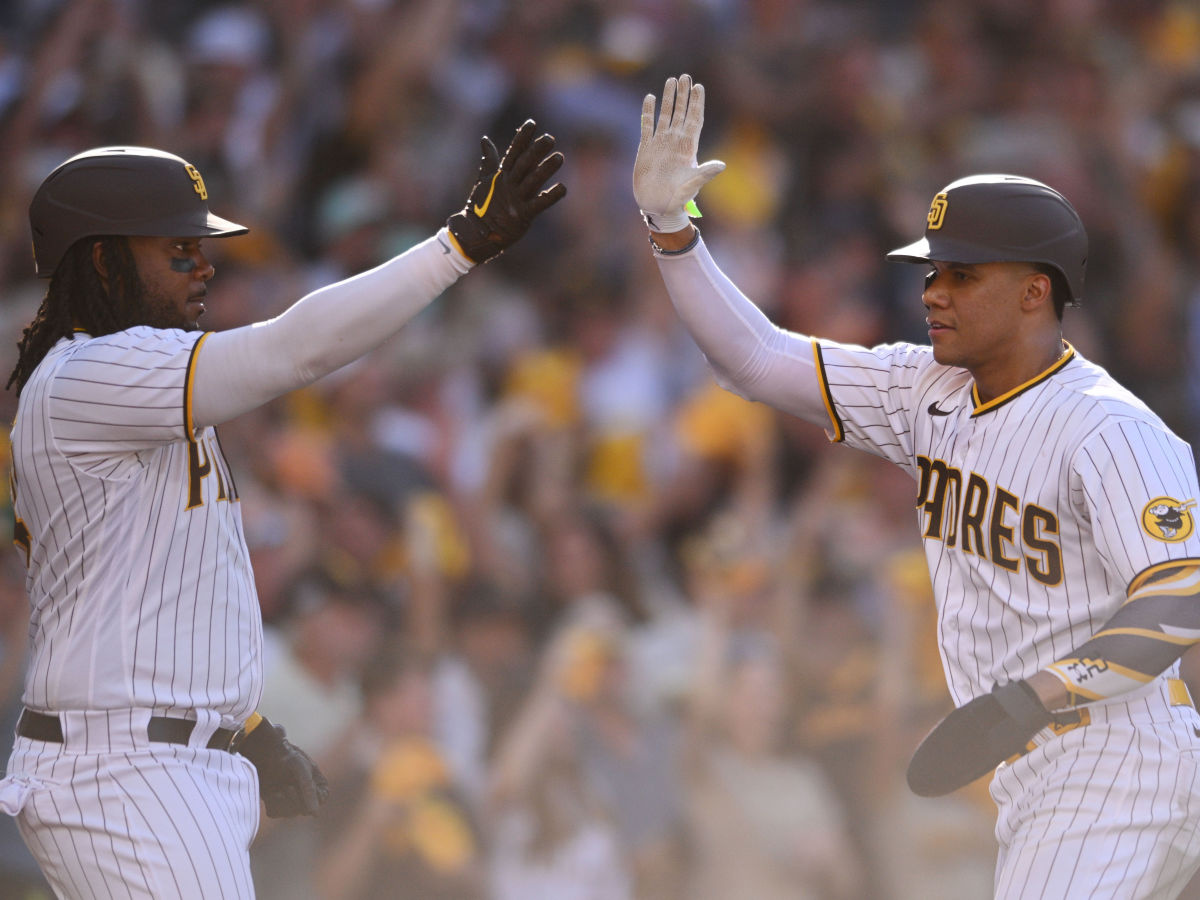Juan Soto Issued a Warning Shot. The Phillies Better Beware.
SAN DIEGO — Juan Soto issued a warning. The Padres right fielder first made his statement when he whistled a double off Phillies ace Aaron Nola on an 0–2 pitch, a spot in which Nola had given up just 11 hits all year. More subtly, he reinforced his point with a long, towering fly ball in his last at bat in NLCS Game 2. The drive went foul, but it was the swing that told Soto he’s close to being locked in.
And in case you didn't pick up on the statement, he issued it after the game, too.
“I’m feeling good,” Soto said after San Diego roared back from down 4–0 with eight unanswered runs in what ended as an 8–5 Padres win to even the series. “Little by little I’m feeling better and better. I think I can get better. That last at bat was one of the best ones today. So I feel pretty good, positive about what’s coming next.”
Four starts in six games from righthanders Zack Wheeler and Nola is the Philadelphia preferred path to the World Series. But the Padres disrupted that plan with their own dynamic duo: Soto and Manny Machado. They combined for four hits, three of them for extra bases. As brilliant as Wheeler was in Game 1, the Phillies in Game 2 did not have the stuff to hold back Soto and Machado, not with a subpar Nola and not with the middle tier of their bullpen.

This was A.J. Preller Appreciation Day at Petco Park. Six of the eight runs by Padres in their first NLCS win in 24 years were driven in by players the San Diego GM acquired at the trade deadline this year: Soto, Brandon Drury and Josh Bell.
Nobody is more important than Soto when it comes to San Diego's World Series chances. If he is about to get hot—and he is due for one of his molten streaks—he can carry a team. The signs are starting to show.
Soto came into Game 2 with a postseason average exit velocity of 93.3, which is better than not only his regular season mark of 91.0 but also the other four seasons in his career. But the results were not there. Soto was hitting .200 this postseason, with one extra-base hit and too many ground balls. He has hit one home run since Sept. 23, and that one was 19 days ago. That’s why he considered his last at bat telling: he caught the ball flush but this time with proper launch angle. In the first inning, for instance, he smashed the hardest-hit ball of the afternoon, 113.6 mph, but it was a hot grounder into the teeth of the shift for an out.
It was his third trip to the plate when the game, and perhaps the series, took a turn. Both Philadelphia manager Rob Thomson and San Diego manager Bob Melvin are old managerial souls when it comes to trusting their best starters. For the second straight day, both managers stuck with their starter as the lineup turned over a third time.
When it happened for Nola in the fifth, he was waist-high in trouble. The Padres had cut the deficit to 4–3 when big brother Austin Nola lined a single off Aaron while Ha-Seong Kim was taking off on a steal of second. Kim didn't stop running until he dove headfirst across the plate. Leadoff hitter Jurickson Profar singled, sending Austin Nola to third and pitching coach Caleb Cotham to the mound.
BACCELLIERI: Inside Austin Nola’s Long Journey to Face His Brother in the NLCS
Crisis time. Get used to it. This will not be the last game of the series that will turn on what the Phillies decide to do with the Soto-Machado combination. In a perfect world, Thomson wants lefthander José Alvarado in this spot. But this was the fifth inning with one of his best starters on the mound. Thomson said it was too early for Alvarado, “especially pitching yesterday,” though that seemed an odd explanation given that he planned to use him sometime in Game 2.
Only as Soto came up did Thomson get a lefty ready. It was Brad Hand. Asked if he had given thought to having Hand up earlier to face Soto, Thomson said, "No, not really, not at that point."
Thomson stuck with Nola, even though the exit velocity on the three batted balls in the inning were 108.7, 101.4, 91.6 and 89.3. It was obvious Nola was in trouble. The Padres were starting to square up his pitches.
Nola jumped ahead of Soto with two strikes, one on a changeup and one on a curveball. At 0–2, Nola can throw his fastball, curveball or changeup, all of which are plus pitches. Because of that variety, on 0–2 counts against Nola this year batters hit .107, with 11 hits in 103 at bats. Nola decided on a sinker. After two soft pitches away, he tried to surprise Soto by going hard in. Soto was ready for it.
"I was aware of it, inside," Soto says. "I know he loves to do that. So I'm looking for it. I'm looking hard. I'm not looking soft at all. I'm looking hard over any part of the plate. But when it's hard in, I just start early."
It wasn't a terrible pitch at 95 mph, but it wasn't a good enough pitch to a superb hitter like Soto. Somehow, he adjusted from an 81-mph curveball away on the previous pitch to a 95-mph sinker in. He ripped it at 105.7 mph for a double. Austin Nola scored the tying run.
JUAN. SOTO.
— MLB (@MLB) October 19, 2022
TIE. GAME. #postseason pic.twitter.com/sSJ1gE36FZ
Aaron Nola did manage to strike out Machado, but with lefty Jake Cronenworth due next, Thomson called on Hand. That's when the avalanche grew.
"I decided to go to Brad, because he's probably the best matchup we have coming out of the bullpen, to try and end that inning right there," Thomson said. "And unfortunately, a little slider got away from him."
Hand hit Cronenworth with that "little slider" on a 2–2 pitch, an especially awful mistake when that's the one batter you are charged with getting. That left Hand against Drury, who slugged .626 against lefties this season. This was not the matchup Thomson wanted to see, not in a tie game. Drury knocked in two runs with a single on another slider. Bell followed with another single for another run, pushing the San Diego lead to 7–4.

The nine-batter sequence included two-strike hits by Austin Nola, Soto and Drury and the two-strike hit by pitch of Cronenworth. The Padres are not going quietly.
"So it's the middle order today, it's at the top sometimes, it's the bottom sometimes," Melvin said. "That's how we're going to have to win. We can't just rely on a few guys in the middle of the order. The bottom has been absolutely fantastic here recently, been nice to get contributions across the board. And it doesn't make you feel like you have to get one spot in the lineup to have some production, we can do it just about any inning.”
Melvin is right about preferred lineup balance, but let's be real: the Padres aren't winning this series unless Soto and Machado hit. The Phillies have their best hitter, Bryce Harper, on fire. Watching these three hitters go to work in the batter's box is a fan's treat and an opposing manager's nightmare. When you line up all the balls hit 100 mph or more this postseason, these are your leaders: Soto 16, Harper 12, Machado 11. In Game 2, the three of them accounted for half of the 12 balls hit that hard, with Soto adding three more to his percussive collection.
The series is tied, and the narrative has been put in place: this is a series of stars, of Soto, Machado and Harper putting pressure not just on pitchers but also on the managers.
More MLB Coverage:
• Inside Austin Nola’s Long Journey to Face His Brother in the NLCS
• Houston’s Haters Are Running Out of Ammo
• Phillies Look to the Past for Their Winning Pitching Strategy
• The NLCS Comes Down to Bryce Harper and Manny Machado
• The Yankees Will Need a New Manager Next Season
